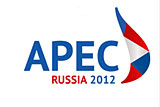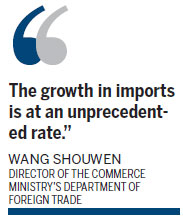
China will strengthen the imports of advanced technology and facilities, consumer goods and resource products, said a senior official of the Ministry of Commerce, a move believed to propel the economic progress within the APEC region.
Wang Shouwen, director of the Commerce Ministry's department of foreign trade, said at the China International Import Conference 2012 in Beijing on Thursday that the government will encourage the import of advanced technology, equipment and key manufacturing components, while providing for an increase in resources and consumer goods.
Consumer goods, which Wang mentioned as a highlight among imports growth, have remained in double-digit growth despite the growth rate of total imports between January and July being in single digits.
 |
|
Special coverage: Hu attends APEC Summit |
"The growth in imports is at an unprecedented rate," Wang said. The country is not only the world's largest exporter but also the second largest importer, contributing greatly to the recovery of global economy and creation of employment opportunities, he said.
He pointed out the huge potential of the Chinese consumer market. Between January to July this year, consumer goods imports have reached $66 billion, up 25.3 percent.
Wan Jifei, chairman of China Council for the Promotion of International Trade, said that imports to China have reached $1.7 trillion in 2011, 4.9 times the figure a decade ago.
The boost of imports will promote economic balance in the world, and facilitate the cooperation and create a win-win situation between China and its global trade partners as well as stimulate the recovery of the global economy, Wan said.
Two-thirds of China's trade volumes have been generated from APEC member countries.
In the time when the global economy has seen a sluggish growth and a weakened recovery, China's move to further increase imports will play an important role in accelerating trade, adding jobs and developing the economy in many countries, said Bai Lichen, vice-chairman of National Committee of Chinese People's Political Consultative Conference.
Bai said the government would further encourage imports through offering more fiscal policy supports, improvements on financial services and management measures.
 |
Within the past five years, bilateral trade has reached $230 billion, a growth of 230 percent. Last year, Brazil exported 17.3 percent of its goods to China.
Brazil's exports to China have been very active, exporting products with a value of $44.3 billion, with a majority in bulk commodity. Last year, bulk commodity took up 85 percent of the exports to China, with a majority in iron ore, soybeans and crude oil.
Schaefer emphasized the importance to enhance the Brazilian exports to China on high-value added products.
John Frisbie, president of the US-China Business Council, said US' exports to China will benefit bilateral trade and ease the trade tension between the two sides.
The increase of exports from the US to China will help satisfy the demand of the Chinese consumer and provide more choices for the Chinese consumer, Frisbie said during the conference. Frisbie also said that growth in exports to China from the US will be a positive and stabilizing factor in Sino-US relations.
Frisbie suggested that China can lower import taxes particularly on consumer products, luxury, jewelry and motorbikes. Currently Chinese consumers purchase about two-thirds of luxury products from overseas due to the large amount of tax levied on the same products sold in China.
Meanwhile, Wang with the Ministry of Commerce expects developed countries to further loosen the curbs on technology exports to China.
In 2001, high tech products from the United States took up 18.3 percent of total such exports to China.
wangzhuoqiong@chinadaily.com.cn